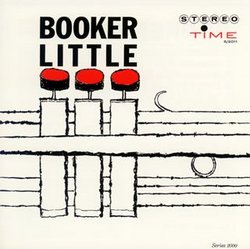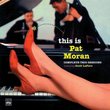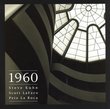| All Artists: Booker Little Title: Booker Little (Shm) Members Wishing: 2 Total Copies: 0 Label: Jvc Japan Release Date: 10/22/2008 Album Type: Original recording remastered, Import Genres: Jazz, Pop Styles: Avant Garde & Free Jazz, Modern Postbebop, Bebop Number of Discs: 1 SwapaCD Credits: 1 |
Search - Booker Little :: Booker Little (Shm)
 | Booker Little Booker Little (Shm) Genres: Jazz, Pop Japanese only SHM-CD (Super High Material CD - playable on all CD players) pressing. Victor. 2008. |
Larger Image |
CD DetailsSynopsis
Album Description Japanese only SHM-CD (Super High Material CD - playable on all CD players) pressing. Victor. 2008. Similar CDs
|
CD ReviewsA most warm and delicious array of music Kevin W. Celebi | Greencastle, IN | 04/06/2008 (5 out of 5 stars) "Now, here is a man who will knock you off of whatever you are sitting with his playing. Listen to this album without preparation and, I am warning you, you will be astounded beyond belief. Listen to Booker's incredibly wide range, impeccable attack on notes, melancholy sound, and remarkable endurance (with relentless 3 or 4 minute solos). Check out the rhythm section - did these guys ever play beforehand or ever again? Tommy Flanagan or Wynton Kelly, Scott LaFaro, and Roy Haynes pool their experience into a rhythm section of firepower and graceful groove. Booker Little's eponymous album introduced a powerful new voice in the jazz trumpet: a musician who actually preferred composition and arranging to playing, yet was equipped with arguably the best technique and ability of any jazz trumpeter. It is also extremely valuable when considering Little's ridiculously under-recorded career, as it is one of his only four albums. The music is powerfully swift ("Opening Statement"), introspectively spiritual ("Minor Sweet"), unapologetically groovy ("Bee's Minor Plea"), heart-rending ("Life's A Little Blue"), anguished and bittersweet ("Grand Valse"), and sorrowful ("Who Can I Turn To"). Little's trumpet playing elevates him (and the listener) as if he were among the elms of a hill's summit. His tone, while leaning towards the flat side, has a beautifully executed vibrato, his harmonic knowledge allows him to hit striking notes (tritone subs, flatted fifths), his improvisations are stunningly melodic and linear, and, most importantly, he dedicates every single note to the significance of his music and the life that it portrays. LaFaro sounds as one who is dreaming alone, playing spiraling, rhythmically complex bass-lines without compromising tonal centers. Haynes relegates to the background and sounds almost non-existent at times. Buyer beware, however, that this album is heartbreakingly full of pain. Most of the music is in the minor key, and even the music that is in the major key is played with such heartfelt interpretation that the listener can't help but feel magnification of his or her life's sorrows, not to mention bemoaning of this trumpet legend's early 20's death. You will enjoy Little's music despite your mood, but it reaches much further down emotionally than many other tapestries of notes can bother to reach. This was Little's only album fronting a quartet, which means that plenty of time is given to the young man to stretch out and penetrate the listener with his musical ideas. The album is lamentably short (maybe 35 minutes), but the Little makes the most of his time. He solos at large length on each tune, including an absolutely mind-blowing cadenza to begin "Minor Sweet." His improvisations contain fleeting lines up scales, searching figures throughout his compositions' mysterious chords (think lots of Lydian dominant chords), and unforgettable virtuosity propelling him through his many statements. The cadenza to open up "Minor Sweet" cannot be praised enough. It is diatonic, consisting of notes from the C minor scale, and is only accompanied by Haynes's free, tribal drumming. Little effortlessly slides between his notes, reaching a climax on a high F (concert Eb) before gunning into a rhythmically amazing melody that switches between breakneck swing and a break-cha-cha chorus (with the aforementioned Lyd-dominant chord) that is spellbinding. "Minor Sweet" is a landmark in the history of recorded jazz and absolutely shattered bebop into unrecoverable shards. Now, this music is not a landscape lined with many flowers, but rather a grove presided by dark, overhanging yews. The melodies are heart-rending and Little's playing is unbelievably breathtaking. He continued to climb the road and see the stars more and more with each step, and the jazz world will never know his final destination, as uremia claimed him at age 23. "Booker Little" is a tragically beautiful album that finds Little at the summit of the jazz trumpet world, arresting listeners with his un-curtained, vulnerable, flawless music. " Booker and Scott David Conklin | Albuquerque, NM USA | 03/27/2007 (5 out of 5 stars) "This is Booker Little's 2nd album as a leader, recorded in April 1960 at age 22, about 1 ½ years before his death. It features the great bassist Scott LaFaro, who would also die the following year, a few days after his classic recordings with Bill Evans at the Village Vanguard. Rounding out the quartet are pianists Tommy Flannagan (on 4 of the 6 songs) and Wynton Kelly (on the other 2 songs), and drummer Roy Haynes. Based on this lineup you might expect a classic, and it is. Little composed 5 of the 6 songs. This recording sounds different than most other jazz albums in that all (or nearly all) the trumpet and piano comes out of one speaker/side and all the bass comes out of the other side. (The drum sound is split, but mostly with the bass.) This can be almost shocking initially, but sounds fine once your ears adjust. I believe the intent was to provide better separation of the instruments and a more natural effect, and it mostly succeeds. The clarity of the audio is also very good. Little's tragic fate left us with only a handful of recordings. Three of the finest, OUT FRONT, BOOKER LITTLE AND FRIEND, and this one are all equally great. I'd rather you heard them yourself than try to describe them musically. However, words like harmonically advanced, lyrical, melancholic, and beautiful have all been used to describe this music. Of course this one (BOOKER LITTLE) features trumpet and bass, while the others feature trumpet with reeds and trombone. When I listen to these albums (and each is unique), I get a sense that I'm hearing something substantial, and am often deeply moved. " If you're buying it for the remastering... Sal D'Agostino | Hoboken, NJ | 03/01/2010 (4 out of 5 stars) "... it does sound appreciably better than the original CD, and it was mastered by the great Bernie Grundman, but be aware that it is not taken from the original master tapes, which no longer exist, but from a vinyl LP. Groove noise is evident. Hopefully it was an original pressing from 1960, but who knows?"
|


